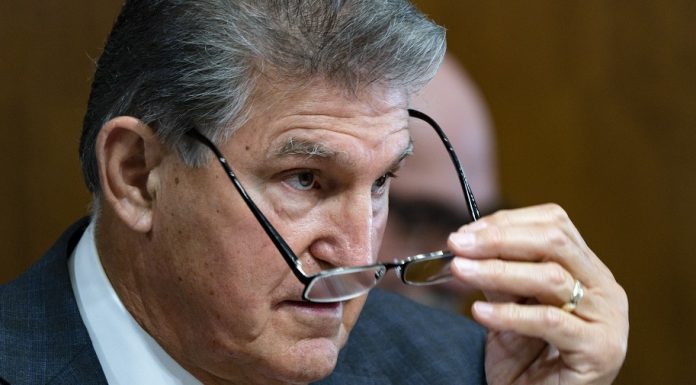UPDATE: Monday 10/25, 6:30 a.m.: Sen. Joe Manchin may have settled on a deal following negotiations with President Joe Biden that would be in the ballpark of $1.75 trillion. However that’s within a range that could still climb considerably higher, according to a second person who insisted on anonymity to discuss the private talks.
Regardless of the bottom line, critics have also pointed to Democrat efforts to shoehorn in non-budgetary items that would promote a radical Marxist agenda, pushing policies like the Green New Deal, amnesty and Critical Race Theory through a secretive procedural gimmick known as reconciliation.
It’s unclear what level of the new taxes Manchin would support, but he generally backs the White House proposals, according to the person who insisted on anonymity to discuss Manchin’s position. Neither person insisting on anonymity was authorized to discuss the negotiations by name.
The White House said the breakfast meeting was a “productive discussion” about the president’s agenda. The talks appeared to last for hours, but no decisions were announced. The Democrats “continued to make progress,” the White House said in its post-meeting statement.
Original story below:
(Headline USA) President Joe Biden brought two pivotal senators to his Delaware home Sunday for talks aimed at resolving the disputes that have stymied the Democrats’ wide-ranging welfare and climate change spending bill.
Beyond the domestic timetable, Biden is pressing for progress so he can spotlight his administration’s big-dollar agenda to world leaders at overseas summits that get underway this week.
House Speaker Nancy Pelosi, D-Calif., said she expected an agreement on a framework by week’s end, paving the way for a House vote on a separate $1 trillion bipartisan infrastructure bill before next Sunday, when a series of transportation programs will lapse.
“That’s the plan,” she said.
The White House said Senate Majority Leader Chuck Schumer, D-N.Y., and Sen. Joe Manchin, D-W.Va., came to Biden’s home in Wilmington, where he was spending the weekend, for the session but did not immediately provide a statement detailing what was discussed.
Manchin and Sen. Kyrsten Sinema, D-Ariz., two of their party’s least left-wing members, have insisted on reducing the size of the enormous package and have pressed for other changes.
Pelosi said she was waiting for the Senate to wrap up talks and was expecting a plan to be introduced as early as Monday.
Top Democrats are scrambling to have a framework so they can move to pass the infrastructure bill, which progressives in the House have held up as leverage to force agreement on the bigger package of health care, education and environment initiatives.
“I think we’re pretty much there,” said Pelosi, stressing that a few “last decisions” need to be made. “It is less than what was projected to begin with, but it’s still bigger than anything we have ever done in terms of addressing the needs of America’s working families.”
Democrats initially planned that the measure would contain $3.5 trillion worth of spending and tax initiatives over 10 years. But demands by moderates led by Manchin and Sinema to contain costs mean its final price tag could well be less than $2 trillion.
Disputes remain over whether some priorities must be cut or excluded.
These include plans to expand Medicare coverage, child care assistance, and taxpayer-funded college tuition.
Manchin, whose state has a major coal industry, has opposed proposals to penalize utilities that do not switch quickly to clean energy.
Pelosi said Democrats were still working to keep in provisions for four weeks of paid family leave but acknowledged that other proposals such as expanding Medicare to include dental coverage could prove harder to save because of cost.
“Dental will take a little longer to implement,” she said.
Also expected to be trimmed is a clean energy proposal that was the centerpiece of Biden’s strategy for fighting climate change.
Biden has set a goal of reducing U.S. greenhouse gas emissions by at least 50% by 2030.
But Manchin has made clear he opposes the initial clean energy proposal, which was to have the government impose penalties on electric utilities that fail to meet clean energy benchmarks and provide financial rewards to those that do.
Sen. Angus King, a Maine independent who caucuses with Democrats, said the expected cuts to the clean energy provisions in the spending bill were especially disappointing because “it weakens Joe Biden’s hands in Glasgow.”
“If we’re going to get the rest of the world to take serious steps to remedy this problem, we’ve got to do it ourselves,” he said.
Pelosi insisted that Democrats had pieced together other policies in the spending bill that could reduce emissions.
“We will have something that will meet the president’s goals,” she said.
Adapted from reporting by the Associated Press.

